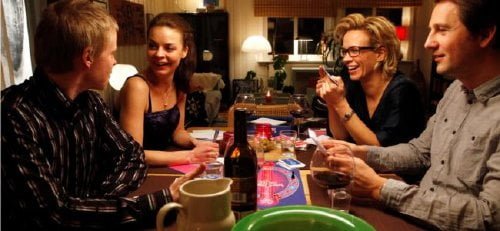Happy, Happy

In a remote Norwegian village, Kaja (Agnes Kittelsen) is excited about the arrival of a new family who will be renting from them. Elisabeth (Maibritt Saerens) is not so keen on the move, one her husband Sigve (Henrik Rafaelsen) suggested as a new start to their compromised marriage. Elisabeth cannot see her own garden for the greener grass she imagines until Kaja, a woman trying to make lemonade from lemons, shows her the road to "Happy, Happy."
Laura's Review: B
This year's winner of the Sundance Grand Jury Prize for World Cinema and the Norwegian selection for the Foreign Language Film Oscar is a femme-centric affair. Anne Sewitsky makes her feature directorial debut with a screenplay by Ragnhild Tronvoll and debuting feature photography director Anna Myking to tell the tale of a woman who hangs onto happiness against all odds. (The Norwegian title, "Sykt lykkelig," translates to Sickeningly Happy.) When they first arrive, Kaja is enthralled with Elisabeth, who she views as gorgeous and sophisticated; Sigve, Elisabeth's genial husband and their adopted Ethiopian son Noa (Ram Shihab Ebedy). Despite Kaja's sunny outlook, her own husband Eirik (Joachim Rafaelsen, apparently no relation to Henrik) prefers to go off hunting by himself than to do anything with her except, perhaps, to gang up on her at the breakfast table with their son Theodor (Oskar Hernæs Brandsø). In fact, tweener Theodor makes 'friends' with Noa by using him to 'play' slavery in a pitch black subplot which comments upon his father's treatment of his mother (and is more than a bit queasy making). When the couples get together for a welcome dinner, we learn much about them. Kaja's the type of person who admires everything about those she meets which, while flattering, is also cause for condescension from Elisabeth. She likes to play games, but Eirik overreacts in the extreme when she fails to guess that his Pictionary drawing is supposed to represent AIDS. When Sigve and Elisabeth reciprocate, Elisabeth's appalled that Sigve's purchased a game too. The Couples Game brings out some underlying truths and Sigve's compassion for Kaja elicits a sexual response. The two fall headlong into a joyous affair. Meanwhile, Eirik approaches Sigve to go hunting and underlying signals hint at something more. Elisabeth, whose own affair was Sigve's reason for moving, picks up her husband's newfound happiness and spills the beans. Each of the four must face what he or she really wants from life. Sewitsky's chosen a four man acapella group to kick off her film and occasionally pop up to comment on the action with corny songs. Singing, in fact, is an important theme, as Kaja's desire to sing in the Church choir is made real when Sigve and Elisabeth invite her along (Kaja's eventual Christmas solo, 'Amazing Grace,' is yet another sung observation). Kittelsen, whose overbite and doe eyes give her an air of vulnerability, makes Kaja distinctly simple but not stupid. Her naivety is a fine line that makes Elisabeth's eye-rolling as believable as Sigve's embrace ('If you only knew what it feels like to be with a warm person.'). When she finally faces facts, her power is palpable, as is her compassion and sense. The film takes place in winter and the snowy landscape is stunning and symbolic of a fresh start. There's a delightful scene where Theodor, walking home from school, is astonished to view his mother and their neighbor Sigve romping naked in the snow. Interiors are homey and warmly lit. Sewitsky's chosen location is as important a setting as the actors who populate it. "Happy, Happy's" U.S. trailer gives the impression of a boisterous comedy and it is misleading. The film is funny, but it is also dark and probes raw emotions.
Robin's Review: DNS
DNS

